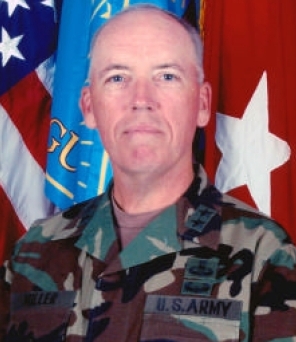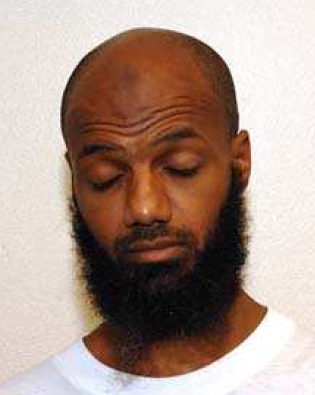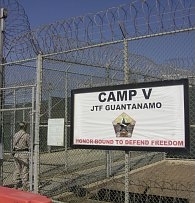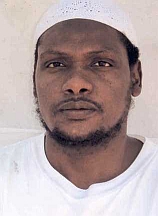
Geoffrey D. Miller is a retired United States Army major general who commanded the US detention facilities at Guantanamo Bay, Cuba, and Iraq. Detention facilities in Iraq under his command included Abu Ghraib prison, Camp Cropper, and Camp Bucca. He is noted for having trained soldiers in using torture, or "enhanced interrogation techniques" in US euphemism, and for carrying out the "First Special Interrogation Plan," signed by the Secretary of Defense, against a Guantanamo detainee.
The 2005 Quran desecration controversy began when Newsweek's April 30, 2005, issue contained a report asserting that United States prison guards or interrogators had deliberately damaged a copy of the Quran. A week later, The New Yorker reported the words of Pakistani politician Imran Khan: "This is what the U.S. is doing—desecrating the Quran." This incident caused upset in parts of the Muslim world.

Binyam Ahmed Mohamed, also referred to as Benjamin Mohammed, Benyam Mohammed or Benyam Mohammed al-Habashi, is an Ethiopian national and United Kingdom resident, who was detained as a suspected enemy combatant by the US Government in Guantanamo Bay prison between 2004 and 2009 without charges. He was arrested in Pakistan and transported first to Morocco under the US's extraordinary rendition program, where he claimed to have been interrogated under torture.
Jumah Mohammed Abdul Latif Al Dossari is a Bahraini citizen who was held for five years at Camp Delta, at the US Naval base at Guantanamo Bay. He spent three and half years in solitary confinement. He was released to Saudi Arabia in 2007 with no charges against him. During the 1990s, he fought in Bosnia and Chechnya.

Omar Amer Deghayes is a Libyan citizen who had legal residency status with surviving members of his family in the United Kingdom since childhood. He was arrested in Pakistan in 2002. He was held by the United States as an enemy combatant at Guantanamo Bay detention camp from 2002 until December 18, 2007. He was released without charges and returned to Britain, where he lives. His Guantanamo Internment Serial Number was 727. Deghayes says he was blinded permanently in one eye, after a guard at Guantanamo gouged his eyes with his fingers. Deghayes was never charged with any crime at Guantanamo.
Extrajudicial prisoners of the United States, in the context of the early twenty-first century War on Terrorism, refers to foreign nationals the United States detains outside of the legal process required within United States legal jurisdiction. In this context, the U.S. government is maintaining torture centers, called black sites, operated by both known and secret intelligence agencies. Such black sites were later confirmed by reports from journalists, investigations, and from men who had been imprisoned and tortured there, and later released after being tortured until the CIA was comfortable they had done nothing wrong, and had nothing to hide.

The Guantanamo Bay detention camp is a United States military prison within Guantanamo Bay Naval Base, also referred to as Gitmo, on the coast of Guantánamo Bay in Cuba. As of March 2022, of the 780 people detained there since January 2002 when the military prison first opened after the September 11 attacks, 741 had been transferred elsewhere, 30 remained there, and 9 had died while in custody.
Abdul Rahim Muslim Dost is an Afghan journalist and jeweller and a former Islamist militant of Taliban and member of ISIL Khorasan Province in late 2015 he publicly disassociated himself from ISIL Khorasan and left militancy, condemning the killing of innocent people by ISIL in Afghanistan.
Mohammed el Gharani is a citizen of Chad and native of Saudi Arabia born in 1986, in Medina. He was one of the juveniles held for seven years at the Guantanamo Bay detention camp where they estimated his age to be 15–16, though Al Jazeera reports his age to have been 14 at the time of his arrest. Human Rights lawyer Clive Stafford Smith identified Al Qarani as one of a dozen teenage boys held in the adult portion of the prison.
The United States Department of Defense (DOD) had stopped reporting Guantanamo suicide attempts in 2002. In mid-2002 the DoD changed the way they classified suicide attempts, and enumerated them under other acts of "self-injurious behavior".
The Center for Constitutional Rights has coordinated efforts by American lawyers to handle the habeas corpus, and other legal appeals, of several hundred of the Guantanamo detainees.

Mohammed Abdul Malik Bajabu is a citizen of Kenya currently held in extrajudicial detention in the United States' Guantanamo Bay detention camps, in Cuba. He was born in Busia, Uganda in 1973, but has Kenyan citizenship. Abdul Malik was captured in February 2007, on suspicion of leading a terrorist bomb-plot in Mombasa. He was transferred to Guantanamo on 26 March 2007. Abdul Malik is a confirmed member of the East Africa al-Qaeda network as well as a confirmed member of the Council of Islamic Courts and the Islamic Part of Kenya. He "actively participated" in the facilitation of weapons and the planning of terrorist acts against the U.S., according to the Joint Task Force (JTF) at Guantanamo Bay. He was recommended for continued detention under the Department of Defense's control. The JTF gave Abdul Malik a high risk threat against the United States' interests and allies. He has no reports of disciplinary infractions as of May 22, 2007, granting him a low detention risk value. Abdul Malik does, however, have a high intelligence value.
Paul Rester is the director of the Joint Intelligence Group at the United States' Guantanamo Bay detention camps, in Cuba—the Chief Interrogator.
Jon Mohammad Barakzai is an Afghan man who was held in extrajudicial detention in the United States Guantanamo Bay detention camps, in Cuba. Mohammed was repatriated in October 2002, together with three elderly men, two Afghanis and a Pakistani. The men described being chained, for hours, during their interrogations.

Detainees held in the United States' Guantanamo Bay detention camps have initiated both individual and widespread hunger strikes at Guantánamo Bay, and camp medical authorities have initiated force-feeding programs.

Separate facilities exist to provide for Guantanamo detainees' medical care.
The Guantanamo Trap is a documentary film about four individuals whose lives were changed by their association with the Guantanamo Bay detention camps. The film was directed by Thomas Wallner and won the special jury prize at the 2011 Hot Docs Canadian International Documentary Festival.






